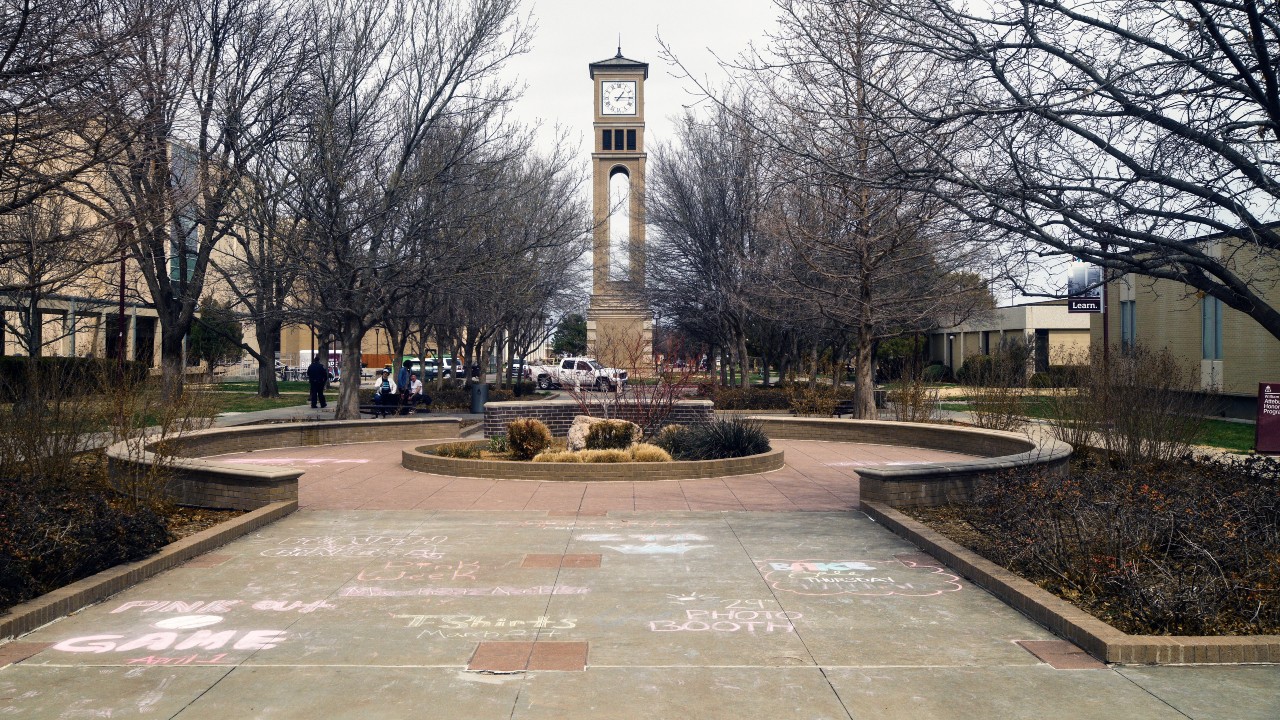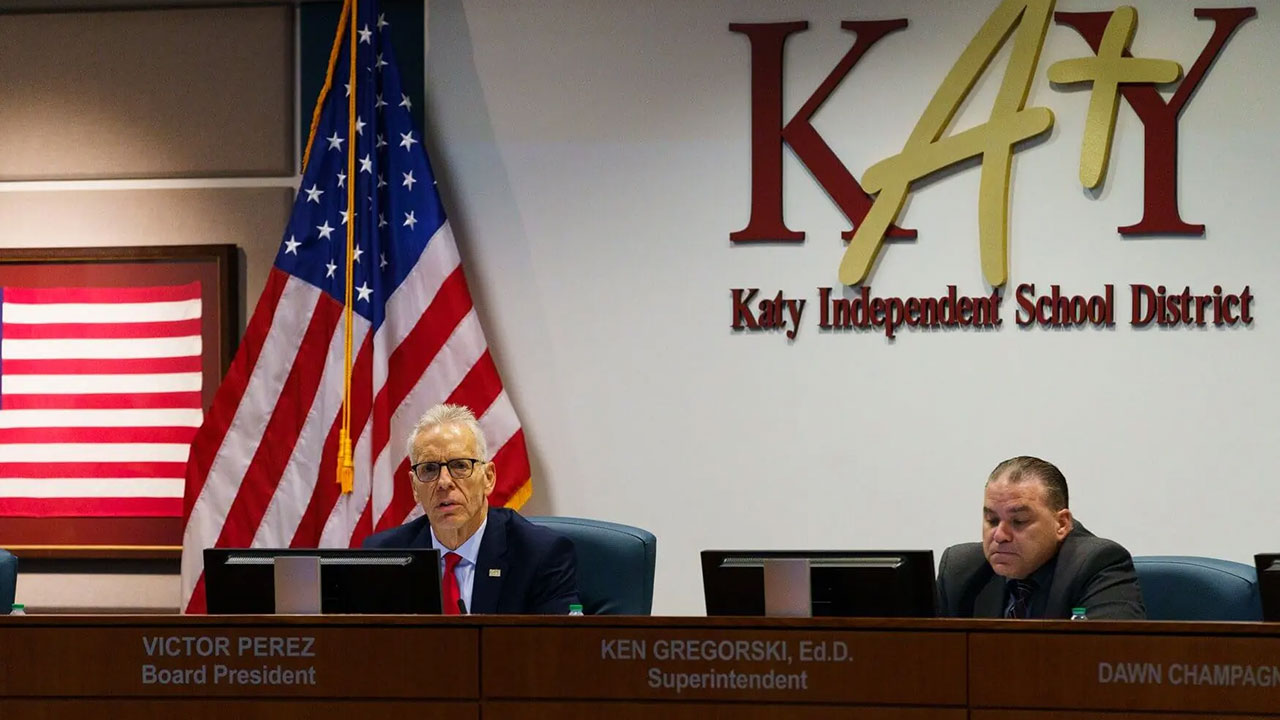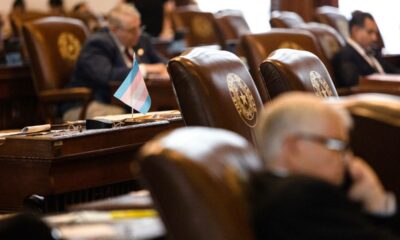Texas
Legal fight over Texas law banning transgender health care for youth centers on whether treatments help or hurt
Texas families and health care providers sued the state over Senate Bill 14, which restricts transgender youth from accessing gender-affirming care. The groups are requesting an injunction from a state district court judge before the law goes into effect on Sept. 1.

This article originally appeared in The Texas Tribune
 At the heart of the legal fight over Texas’ new ban on puberty blockers and hormone therapy for transgender children is an ongoing debate about whether those treatments help or hurt youth with gender dysphoria.
At the heart of the legal fight over Texas’ new ban on puberty blockers and hormone therapy for transgender children is an ongoing debate about whether those treatments help or hurt youth with gender dysphoria.
During a two-day hearing over an attempt to block the law from taking effect Sept. 1, medical experts testified that such gender-affirming treatments are safe. The state attorney general’s office called on its own scientific professionals, who cast doubts on the existing research.
Families of trans youth and medical professionals are suing Texas, asserting that state lawmakers discriminated against trans youth in crafting the prohibition and that the law violates the rights of parents to choose medically approved care for their children.
The new law does not ban any particular treatments or medical care outright. They are prohibited only for the purpose of gender transitioning.
“Make no mistake, our doctors are not being targeted for the type of care they provide. They are not being targeted for the quality of their care. They’re being targeted because of the community they are providing care for,” Alex Sheldon, executive director of GLMA, an association of LGBTQ+ health professionals that is one of the plaintiffs, told reporters outside the courthouse on Wednesday.
The state rejected the claim of discrimination. In her opening statement, Assistant Attorney General Heather Dyer rejected the plaintiffs’ claim that Senate Bill 14 discriminates based on sex because, she said, people with gender dysphoria are not a protected class.
“SB 14 was designed to protect minors from scientifically unsound treatments,” Dyer said.
The new law would ban transgender youth from taking puberty blockers, receiving hormone therapies and having transition-related surgery, the latter of which is rarely performed on minors. Such medical interventions are used to treat gender dysphoria, a medical term for the distress someone experiences when their gender identity doesn’t match their body. The plaintiffs assert that the new law violates their parental rights and interferes with their ability to practice medicine.
Legal groups including the American Civil Liberties Union of Texas, Lambda Legal and the Transgender Law Center requested that Travis County District Court Judge Maria Cantú Hexsel issue an injunction against the law.
Doctors defend gender-affirming care
Dr. Johanna Olson-Kennedy, a doctor who treats adolescents and has been providing gender-affirming care for 17 years, said the body of medical research demonstrates these treatments have a high success rate in improving mental health outcomes of trans youth. But in her clinical work, the evidence is more obvious.
“Recently, I had one of my patients tell me, ‘If you had not allowed me, and helped shepherd me through these interventions, I don’t think I would be here,’” said Olson-Kennedy, the medical director of the Center for Transyouth Health and Development at Children’s Hospital Los Angeles.
She added that hundreds of her patients have expressed the same sentiment in her nearly two decades treating roughly 1,100 young patients.
A central argument of lawmakers supporting SB 14 during the legislative session was that puberty blockers and hormone therapies put young patients at risk for fertility loss and a reduction of bone density. Defense attorneys for the state repeated these claims.
The medical experts called on by the plaintiffs rejected those claims Tuesday, arguing that the scientific literature supports the use of hormones or puberty blockers as a means to improve the mental health of transgender youth and reduces the dysphoria these young people feel.
“I would not consider estrogen or testosterone the end of the story for fertility,” said Dr. Daniel Shumer, a pediatric endocrinologist at the C.S. Mott Children’s Hospital in Ann Arbor.
Pediatric endocrinology is the field of medicine that specializes in transgender adolescent health care.
Representing the state, Assistant Attorney General Johnathan Stone asked Shumer about the number of his patients who stopped receiving gender-affirming treatment. A group of people who refer to themselves as detransitioners have been vocal opponents of gender-affirming care for youth in legislative hearings throughout the country. During this year’s regular Texas legislative session, Republican lawmakers called on several people who had detransitioned to testify in support of SB 14.
Shumer said of his roughly 400 patients, 10 had stopped taking puberty blockers, a reversible treatment that delays the onset of puberty, and two had stopped taking hormones.
Olson-Kennedy noted that there are a variety of reasons people detransition — including a lack of acceptance of their new identity or a loss of health care access — but overall, the number of people who do take this step is very small.
Dr. Aron Janssen, a psychiatrist at the Ann & Robert H. Lurie Children’s Hospital of Chicago, testified to the evidence that psychotherapy alone cannot alleviate gender dysphoria, asserting that puberty blockers or hormone therapy is medically necessary. By restricting access to these treatments, young patients will have worse outcomes, Janssen said.
“There’s an intense improvement we see amongst these kids,” Janssen said of his clinical experience.
The defense
The state disputed the efficacy of puberty blockers and hormone therapy based on the amount and quality of research. Other witnesses for the state argued transgender people can not change their sex and that young people cannot comprehend the long-term implications of these treatments.
The state’s first witness on Tuesday was evolutionary biologist Colin Wright, who has a Ph.D. in evolutionary biology and ecology from the University of California Santa Barbara. Wright testified that humans can only be “observed and recorded” as either the male or female sex. While individuals can modify their secondary sex characteristics, like body hair and breast development, Wright said people cannot change their sex.
Lawyers for the plaintiffs noted that Wright was not an expert in gender dysphoria and had not published original research on the topic of biological sex. Wright, who is vocal on his social media platforms about his opposition to gender-affirming care for minors, was asked if he thought transgender individuals were delusional. Of the idea that people can change their sex from what was assigned at birth, he said, “that specific belief is a delusional belief.”
Dr. Michael Laidlaw, an endocrinologist affiliated with the Sutter Roseville Medical Center in California, said Wednesday that the risks of using puberty blockers and hormone therapy outweighed the benefits. He said reviews of the existing research on these treatments indicate there is limited evidence to show the benefits of using puberty blockers on minors.
Katrina Taylor, an Austin-based therapist designated as an expert witness in psychotherapy, offered starkly different testimony about the origin of gender dysphoria in children.
“When there is gender dysphoria, I see it as a symptom of the family,” said Taylor, the state’s expert witness on psychotherapy. “There’s something going on in that family system that is awry, that is going wrong.”
The state focused attention on the concept of “informed consent” — the agreement to provide care between a health care professional and their patient — and whether minors could agree to receive puberty blockers, hormone therapies and surgery.
Dr. Clifford Hopewell, a North Texas neuropsychologist and former Texas Psychological Association president, said an adolescent’s reasoning was limited based on their brain development and therefore couldn’t appreciate the risks of some gender-affirming care treatments.
“They don’t know what puberty blockers are,” Hopewell said. “An adolescent doesn’t understand that.”
Texans testify
Wednesday was the second day of Nathan Noe’s new school year, but instead of spending the morning at high school, he was in the Travis County Civil and Family Courthouse testifying on how SB 14 would cut him off from life-changing medical treatments. For two years, Noe — who is using a pseudonym as a plaintiff for the lawsuit — has been taking testosterone, which he said dramatically shifted his life for the better.
“I was able to go about my life as a teenage boy, like I wanted to,” Noe said, smiling on the stand.
Parents of trans youth like Noe testified about the impact SB 14 would have on their families. Another parent, identified by the pseudonym Mary Moe, said she and her daughter have moved out of the state in the wake of SB 14.
“I would like to return to Texas, but Texas has become very ugly to me and my family,” Moe said.
Texas health care workers, also named as plaintiffs in the lawsuit, spoke to SB 14’s impacts on their practice. Dr. David Paul, a pediatric endocrinologist who works at Texas Children’s Hospital in Houston, said SB 14 would strip him of the ability to provide the standard of care for his transgender patients.
“They are probably the most positive outcomes of all the patients I see,” Paul said of patients who receive gender-affirming care. If his patients couldn’t access this type of care, Paul said he worries their physical and mental health will deteriorate. He added he has already lost one of his patients to suicide.
To attest to the regret some people experience after receiving gender-affirming care, the state called on Soren Aldaco, a woman who took testosterone when she identified as transgender boy and received top surgery when she was 19.
Aldaco testified that her mental health did not improve after taking hormones and was forced to deal with a number of complications from receiving chest reconstruction surgery. She has since filed a lawsuit against her medical providers for failing to follow their duty of care.
Texas’ new law will still allow transgender people 18 or older to receive chest reconstruction surgery. It will also allow cisgender girls under 18 to have breast augmentation surgery.
Texas lawmakers’ efforts to restrict gender-affirming care in Texas followed nearly identical campaigns from other Republican-led state legislatures. Across the country, 19 other states have passed similar legislation. Prohibiting doctors from providing gender-affirming care to trans youth is widely popular among Republican voters — over 85% of registered GOP voters in Texas supported these restrictions to some degree, according to an April poll by the Texas Politics Project.
But the wave of new legislation invited a series of lawsuits across the country seeking to block the laws from going into effect. Those suits have largely proved successful in federal courts.
In June, a federal judge ruled that Arkansas’ ban on gender-affirming care for minors is unconstitutional because it violates the due-process and equal-protection rights of transgender children and their families. Federal judges in Florida, Kentucky and Tennessee have also blocked those states’ laws from going into effect. An appeals court intervened to allow Tennessee to implement its ban, and the Kentucky federal judge lifted the injunction he issued, allowing the law to go into effect.
This lawsuit is filed in state court and claims SB 14 violates parental-right protections laid out in the Texas Constitution.
Disclosure: The ACLU of Texas has been a financial supporter of The Texas Tribune, a nonprofit, nonpartisan news organization that is funded in part by donations from members, foundations and corporate sponsors. Financial supporters play no role in the Tribune’s journalism. Find a complete list of them here.
The Texas Tribune is a nonpartisan, nonprofit media organization that informs Texans — and engages with them – about public policy, politics, government and statewide issues.
Education
Feds investigate another Texas school district for its gender identity mandate
Katy ISD’s board voted this past fall to require staff to notify parents if their child wants to use a different pronoun or identifies as a different gender.

This article originally appeared in The Texas Tribune
 The U.S. Department of Education’s Office for Civil Rights opened an investigation Monday into Katy Independent School District’s gender identity policy on the basis of gender harassment under Title IX. The investigation came nine months after the Houston Landing reported that the district adopted a policy that notifies parents if their child requests to use a different name or pronouns at school.
The U.S. Department of Education’s Office for Civil Rights opened an investigation Monday into Katy Independent School District’s gender identity policy on the basis of gender harassment under Title IX. The investigation came nine months after the Houston Landing reported that the district adopted a policy that notifies parents if their child requests to use a different name or pronouns at school.
Katy ISD did not respond to a request of how many parents have been notified this year under the new policy, which requires staff to inform parents that students are transgender or ask to use different names or pronouns.
The Houston Chronicle reported in December that the district had notified parents at least 23 times since the policy was adopted.
The gender identity policy also bars schools from teaching “gender fluidity” and denies students from competing in sports with the gender they identify with, which mirrors state legislation already regulating K-12 athletics.
Students Engaged in Advancing Texas, a student-led advocacy group, filed a complaint with the U.S. Department of Education in November regarding the policy. Katy ISD graduate and member of SEAT Cameron Samuels labels the investigation as a win against the conservative policies being passed in the district.
“Elected solely on platforms to target marginalized students, far-right school board candidates accomplished exactly what they were elected to do: weaponize identity and neglect students’ educational needs,” they said.
Title IX prohibits sex-based discrimination in educational settings or federally funded activities. Gov. Greg Abbott has loudly voiced his opposition to the federal law recently ordering the Texas Education Agency to disregard the Biden administration’s expansion of Title IX.
“The district is committed to offering equal educational opportunities to our entire community,” a spokesperson from Katy ISD told the Tribune in a response to the investigation. “While we have received the OCR filing and deny any wrongdoing, we are committed to remaining fully cooperative and responsive throughout the process.”
Victor Perez, Katy ISD board president and proponent of the policy, argued that the policy was “mischaracterized” by community members as an attack on its queer and transgender students and instead relieves the burden for staff withholding information from parents. The policy was passed at a board meeting in August with a vote of 4-3 after four hours of public comment.
Alastair Parker, a member of the Cinco Ranch High School Gender-Sexuality Alliance, spoke at the board meeting in opposition to the policy.
Parker and others argued that the policy infringes on the rights of transgender kids to express themselves and opens them to potential harm if they are outed to transphobic parents or caregivers.
Johnathan Gooch from Equality Texas, a nonprofit advocacy group for LGBTQ+ Texans, said he hopes students recognize their power to report policies like this in the wake of the increasing number of legislation targeting LGBTQ+ youth.
This isn’t the first instance in Texas of a gender related policy being investigated on the federal level. Carroll ISD in Tarrant County was reported to have eight open investigations last February after it eliminated protections over race, religion, gender and sexual orientation.
There are documented mental health benefits to using preferred pronouns. A research team at the University Texas at Austin conducted a study in which they concluded that students in gender-affirming environments report 71% fewer symptoms of severe depression, a 34% decrease in reported suicidal ideation and a 65% decrease in suicide attempts.
“When students place their trust in teachers and school administration, the school has a duty to preserve that trust,” Gooch said. “That duty requires schools to ensure that no disclosure would place a student in harm’s way.”
Parker has been out as a transgender man since the seventh grade and is supported by his father, who he resides with. He acknowledged that this isn’t the case for many of his classmates as some have parents that are less accepting.
His teachers have gone by his preferred name and pronouns for his entire high school experience. But since the policy has been enacted, he has seen some of his peers go by their deadnames fearing that their parents would be notified.
Over the past year, other schools across the state have adopted similar policies.
Keller ISD, which is also in Tarrant County, passed a policy in late June that prevents students from using their preferred name and pronouns or using restrooms with the gender they identify with.
The policy was met with retaliation from the Texas American Civil Liberties Union, writing in a letter to the district that the policy is “deeply invasive and unlawful for school administrators to interrogate students’ private medical information in this way.”
As the end of the school year nears, Parker observed the policy being enforced at varying levels of severity by teachers. The passing of legislation or policy like this deters from the ongoing health crisis for queer and transgender youth and is wholly unnecessary, he said.
“If a child’s not telling their parents something like that, it’s for a reason,” he said. “I know that most of the people who are in favor of this are the ones who bounce off whatever their parents have told them to repeat.”
Disclosure: Equality Texas has been a financial supporter of The Texas Tribune, a nonprofit, nonpartisan news organization that is funded in part by donations from members, foundations and corporate sponsors. Financial supporters play no role in the Tribune’s journalism. Find a complete list of them here.
The Texas Tribune is a nonpartisan, nonprofit media organization that informs Texans — and engages with them – about public policy, politics, government and statewide issues.
Amarillo
Appeals court considers whether West Texas A&M drag show was unconstitutionally banned
University President Walter Wendler canceled a drag performance last year, claiming such shows “denigrate and demean women.”

This article originally appeared in The Texas Tribune
 A federal appeals court considering whether West Texas A&M University’s president violated the First Amendment when he canceled a campus drag show last year focused many of their questions Monday on a U.S. Supreme Court ruling that upheld campus non-discrimination policies.
A federal appeals court considering whether West Texas A&M University’s president violated the First Amendment when he canceled a campus drag show last year focused many of their questions Monday on a U.S. Supreme Court ruling that upheld campus non-discrimination policies.
But the panel of three judges used that 2010 case — which said universities can require groups to admit LGBTQ+ students — to suggest that school officials could also ban drag shows because some people find the performances offensive to women.
A lawyer representing a group of West Texas A&M students who’ve twice attempted to host a drag show on campus argued before the 5th U.S. Circuit Court of Appeals Monday that President Walter Wendler discriminated based on viewpoint and censored speech when canceling the performances.
In March 2023, Wendler banned drag shows in response to a student fundraiser that featured drag performers. The president argued the performances “denigrate and demean women,” and shouldn’t be allowed on the public university’s campus.
In September, a federal judge said Wendler acted within his authority to cancel the drag show. In his opinion, U.S. District Judge Matthew Kacsmaryk wrote, at “this point in Free Speech jurisprudence, it is not clearly established that all ‘drag shows’ are categorically ‘expressive conduct.’”
Last month, students with WT Spectrum, the student group at the university, hoped to hold another drag show on campus — to show support for the LGBTQ+ community in a staunchly conservative corner of Texas.
With Wendler’s campus-wide ban still in place, the Supreme Court declined to intervene and the president again ordered the fundraiser from taking place.
The panel of judges hearing the appeal Monday were James Dennis, James Ho and Leslie Southwick.
Many of their questions centered around Christian Legal Society v. Martinez, a case in which the Supreme Court upheld a policy of the University of California, Hastings College of the Law, that bars student groups from excluding members based on status or beliefs.
In 2010, the Supreme Court affirmed that Hastings’ policy does not violate the First Amendment rights of CLS, a group of students that wanted to be officially recognized on campus while not allowing people who engage in “unrepentant homosexual conduct” from joining.
The 5th Circuit judges Monday seemed to suggest that Wendler’s ban was no different from the policy at the center of the 2010 Supreme Court case. One of the judges, who didn’t identify themselves before speaking, asked if plaintiffs intended to use the case in question to overturn CLS.
“Maybe we should overturn CLS?” one of three judges said. “Many people would like CLS overturned.”
Ho equated the policy upheld in CLS with Wendler’s drag ban. He said both intend to make everyone feel included, but the policies have the consequence of targeting one group. In CLS’ case, he said that Christians were singled out on Hastings’ campus for not allowing LGBTQ+ individuals to join. Ho said that previous groups on Hastings’ campus could exclude members, but CLS was singled out by the university’s non-discrimination policy.
JT Morris, senior attorney for the Foundation for Individual Rights and Expression who represented the students, argued that the judges were comparing “apples to oranges” between the two cases.
Morris argued CLS is about a content-neutral policy, while Wendler was clearly discriminating based on viewpoint.
“The First Amendment does not allow the government to use the subjective term ‘offensive’ to restrict speech,” Morris said.
Joseph N. Mazzara, a lawyer with the Texas Attorney General’s Office who represented Wendler, said the students had not suffered any injury as a result of the no-drag policy because there was no future event featuring drag performers planned. Additionally, Mazzara said Wendler’s policy carried no criminal penalties and students could host drag performances off campus.
Mazzara said Wendler’s ban was not a free speech violation, but rather it was akin to banning certain conduct, like skateboarding on the grounds of a monument. He said drag shows constituted conduct, not speech.
“They’re able to do everything they want to do, they’re able to say all the speech they want to [say],” Mazzara said, referring to the student group WT Spectrum. “They just can’t do this one particular thing in this one particular place.”
A judge asked Mazzara how the university would have treated drag shows put on by other student groups, such as a fraternity. The judges seemed to agree with Mazzara that Wendler’s restriction did not target a specific viewpoint.
“If a Christian legal group wanted to have a ‘Drag for Jesus’ event that would also be banned,” Mazzara said.
One judge suggested that some drag shows are offensive to the transgender community, and thus Wendler’s ban would equally protect that population from offensive performances.
Allison Marie Collins, another lawyer from the Attorney General’s Office representing other defendants named in the lawsuit, argued the appellate judges should not impose any restrictions on Texas A&M system Chancellor John Sharp or West Texas A&M Vice President for Student Affairs Christopher Thomas. She argued an injunction against Sharp or Thomas would be overbroad, because it’s clear that only Wendler has acted to stop these shows.
“Neither Chancellor Sharp nor Dr. Thomas have remotely engaged in viewpoint discrimination, exclusion from a public forum or a prior restraint complaint to speech,” Collins said.
In his rebuttal, Morris argued the plaintiffs have standing over Sharp because he has the authority over Wendler to put an end to this restriction on free speech.
“He has the authority to do what’s best for the campus,” Morris said of Sharp. “He should have put an end to this prior restraint, which shouldn’t have lasted a day, and has now lasted a year.”
Disclosure: Texas A&M University and West Texas A&M University have been financial supporters of The Texas Tribune, a nonprofit, nonpartisan news organization that is funded in part by donations from members, foundations and corporate sponsors. Financial supporters play no role in the Tribune’s journalism. Find a complete list of them here.
The Texas Tribune is a nonpartisan, nonprofit media organization that informs Texans — and engages with them – about public policy, politics, government and statewide issues.
Education
Under Katy ISD gender policy, student identities disclosed to parents 19 times since August
Public records obtained by the Houston Landing offer the first glimpse at how often the new, hotly contested policy has been used to disclose LGBTQ+ students’ identities to parents — even if the students aren’t ready.

 Since narrowly passing a controversial gender policy two months ago, Katy Independent School District has sent 19 notifications informing parents that their child identified themselves as transgender or requested to use different names or pronouns at school.
Since narrowly passing a controversial gender policy two months ago, Katy Independent School District has sent 19 notifications informing parents that their child identified themselves as transgender or requested to use different names or pronouns at school.
The number of parental notifications, obtained by the Houston Landing through a public records request, is the first glimpse at how often the new, hotly contested policy has been used to disclose LGBTQ+ students’ identities to parents — even if the students aren’t ready.
So far, the district averages a notification to a parent roughly once every three days.
The district’s policy requires staff to inform parents if their student requests to use different pronouns or names, or if they identify themselves as transgender — and obtain written parental consent to comply with the request. It also prohibits employees from asking for students’ preferred pronouns and discussing “gender fluidity,” and requires students to use bathrooms that align with their sex assigned at birth.
Jarred Burton, a student leader at Tompkins High School’s Sexuality and Gender Alliance, said the number of notifications already sent to parents is both depressing and surprising. Critics, including Katy parents, LGBTQ+ students and local advocates, have blasted the policy as a dangerous measure with the potential to expose students’ gender identities to unsupportive parents, further harming a community that already faces a higher risk of mental health issues than their peers.
“It’s just sad to see this actually happening,” Burton said. “It shows that (the policy) is not a bluff.”
Board members who supported the policy hailed it as a measure that would center parents’ right to be informed about their child’s gender identity and protect teachers from making uncomfortable decisions about concealing such information from parents.
“(Parents are) supposed to be looking after the health and welfare of their child,” Board President Victor Perez said at a late August meeting. “Withholding that information from the parent, that is a great burden on staff.”
It’s unclear how many parents were already aware of their child’s gender identity. District officials also did not make any board members available for an interview on the matter.
“The policy is intended to provide parents and guardians the opportunity to be made aware of their child’s name change request, and the opportunity to grant or deny approval of said request,” Katy spokesperson Nick Petito said in a statement Wednesday.

Ash Thornton, a transgender man and a junior at Tompkins High School, said the number of notifications being sent home will discourage LGBTQ+ students from feeling safe to explore their identities.
“It signals that it’s something bad, them being transgender or expressing gender in a way that’s different,” Thornton said. “It definitely messes up student-teacher relationships.”
Employees are not required to comply with a student’s name or pronoun change even if a parent gives consent, the policy states.
One staff member on every campus is responsible for processing and sending notifications to parents and guardians, Petito said. The policy makes an exception for “cases of suspected abuse.”
Students belonging to LGBTQ+ clubs have told the Landing the policy has caused their schools to become less of a safe space and has instilled fear among LGBTQ+ youth in Katy.
“There’s just been this looming cloud of dread over a lot of people,” Burton said in a September interview. “There’s gonna be a lot of people that get in trouble by their parents or get hurt. … It just sometimes keeps me up at night a little bit because it’s hard to imagine how much hate people can have to pass something like this.”
The number of notifications sent to parents to date leaves Thornton to wonder what else is to come.
“It’s only been two months and there’s already 19, how many more people are going to be affected by even just the end of the semester?” he said.
The Houston Landing is a nonprofit newsroom devoted to public service journalism for all Houstonians.
This article first appeared on the Houston Landing and is republished here with permission.















